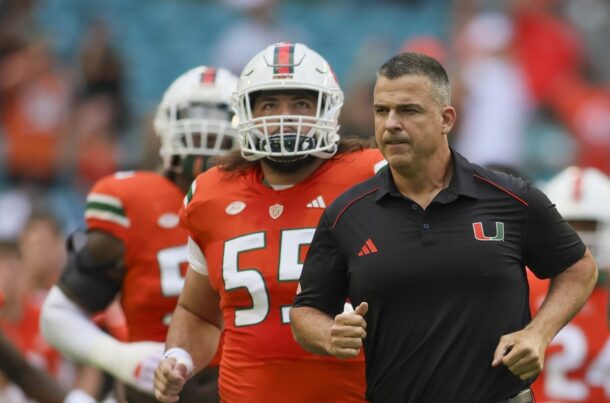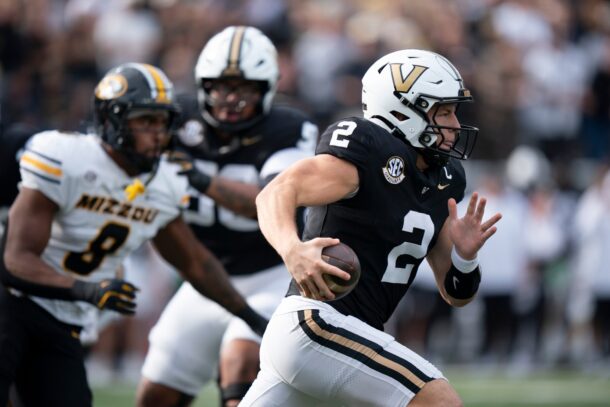
2024 Chaos Scenarios, No. 8: Traditional powers are “back” after a breakthrough victory
The following is part of a 10-part series, wherein I (Connor O’Gara) outline 10 chaos scenarios for the 2024 college football season. These are not predictions. These are, however, things that could happen that would create a significant ripple effect in the sport.
What is chaos, you ask? Last year, Texas beating Alabama caused chaos because it was the preamble for Texas’ return to the national spotlight while the Tide had “sky is falling” energy that prompted a QB change and a discussion about Nick Saban’s future. Saban’s retirement was also chaos because it prompted 4 FBS coaching vacancies, as well as raises for coaches who were reportedly targeted as his successor.
Chaos can come in non-Saban ways, too. Florida State getting left out of the Playoff as a 13-0 Power 5 champion was chaos, as was Deion Sanders beating defending national title runner-up TCU in his Colorado debut. Chaos can come in a variety of forms.
So far, we did:
- No. 1 — What if Ohio State fires Ryan Day?
- No. 2 — The chaotic teams that can win a title
- No. 3 — What if Lincoln Riley actually has a defense?
- No. 4 — A team with multiple losses wins the national title
- No. 5 — A Group of 5 team wins a Playoff game
- No. 6 — What if Quinn Ewers gets hurt again?
- No. 7 — What if Billy Napier gets fired?
Today is the eighth installment of the 10-part series for 2024 …
There’s a specific example I always go back to when a traditional program feels “back.” Believe it or not, that’s not a Texas thing. Sam Ehlinger claiming that the Longhorns were back after a 4-loss season shouldn’t be the go-to, and neither should Joe Tessitore declaring “Texas is back, folks,” after a double-overtime thriller against Notre Dame to kick off the 2016 season (both teams ultimately missed bowl games that year).
Nah. You see, those moments were about an individual pushing that narrative.
To have all of us truly feel like a traditional power is “back,” it needs to be a late-season game in which the significance is undeniable. That prime example during the 2010s was when Miami hosted College GameDay on Nov. 11, 2017. It was the first time that had happened since 2006. The Turnover Chain had taken over college football and the vibes couldn’t have been better. Alex Rodriguez was the guest picker for a showdown between No. 3 Notre Dame and No. 7 Miami. With a win, making the Playoff would suddenly feel realistic.
In front of a packed house, the Canes didn’t just win. The “U” blew the doors off the Irish.
I remember the ABC cameras showing Rodriguez and then-girlfriend Jennifer Lopez going crazy in the Hard Rock Stadium suites as the Canes looked all the way back that night.
Saturday night, @CanesFootball familiarized Notre Dame with the “Turnover Chain.” pic.twitter.com/BUxTMahAZy
— Stadium (@Stadium) November 12, 2017
That night felt like chaos. Unfortunately for Miami, it’s been anything but chaos since that game. It wasn’t just that the 2017 squad closed the season with 3 consecutive losses. In those 6-plus seasons post-Notre Dame win, Miami is just 41-37. That’s the last time the Canes beat a top-10 team (0-8) and it earned 6 wins against AP Top 25 teams from 2018-23.
Chaos in 2024 would indeed be nights like that one in Miami. A traditional power that breaks through is always chaos. But it’s even more chaotic in 2024 because of the expanded Playoff.
More than ever before, many will have the false illusion that certain traditional powers are close to the Playoff, thus making them close to a national title. That creates chaos for the obvious reason because when bigger brands win “breakthrough games,” you get more national conversation from casual college football fans. Or rather, the casual national media that only discusses college football when a team from their youth looks good again.
While I can’t stand that potential impact — there are enough entertaining teams in this sport every year — it does mean more conversation. Even though they’ve been down, there’s confirmation bias with traditional powers like USC, Miami, Nebraska, Penn State and Notre Dame, which has been better than those 4 but still has some troubling 21st-century stats.
Speaking of those teams, those are at the crux of our discussion today (Texas moved past that by getting a Playoff berth and Tennessee is also clear on the heels of its best 2-season stretch in 2 decades).
USC, Miami, Nebraska, Penn State and Notre Dame are the biggest 5 teams that would qualify for “traditional power has a breakthrough victory.” Why? Look at these trends:
- Notre Dame
- 3-23 vs. AP top-5 teams since 1999
- 2-11 vs. AP top-10 teams in Playoff era
- USC
- 0 AP top-10 wins in 2020s
- Last win vs. AP top-5 team was 2016 Rose Bowl vs. Penn State
- Miami
- 0-8 vs. AP top-10 teams since the 2017 Notre Dame win
- 2 wins vs. AP top-10 teams in the post-Larry Coker era (last 17 seasons)
- Penn State
- 1-12 vs. AP top-10 teams in the past 7 seasons
- 4-16 vs. Michigan & Ohio State in the James Franklin era
- Nebraska
- Last win vs. AP top-25 team came in Sept. 2016 vs. Oregon … who went 4-8
- Last win vs. AP top-10 team was 2015
- Last win vs. AP top-5 team was 2001
Those premier wins have been so hard to come by. That’s why it’ll feel significant if it happens. It’s why it’ll bring casual fans out of the woodwork and into “chaos” mode. We do it in college football more than any other sport because nostalgia plays such a big part in the specific lens that we look through.
Yet you know that the second Nebraska finally beats a ranked foe for the first time in 8 years, we’re going to get the “P” word. As in “Playoff.” They’ll lack the stats I referenced.
Penn State is a worthy part of this discussion because while there’s an expectation that the expanded Playoff will greatly benefit a team that never made the 4-team field, recent history doesn’t suggest that Franklin will start mowing down top-10 teams. His lone win vs. an AP top-10 team since the Big Ten title season (2016) came against Utah in the 2022 Rose Bowl when Cam Rising left the game with a knee injury that sidelined him not just for the game, but for the entire 2023 season that followed.
Notre Dame will have more preseason buzz than any of those teams, and deservedly so. It earned top-15 finishes in 6 of the past 7 seasons. The Irish will likely start as a top-10 team with some top-5 buzz. Nobody would be surprised if the Irish made it to the 12-team Playoff. But to win the 12-team Playoff, Notre Dame would probably have to match its total of top-5 victories (3) that it had in the last quarter century.
Context often lacks for the “breakthrough win for a traditional power” conversation. It probably lacked with Miami in 2017, too. After all, the Canes’ only other win vs. an AP top-10 team in the previous decade came in 2009 against an Oklahoma team that finished 8-5 that season. It felt like a “breakthrough win” in 2017 because all signs pointed to Miami finishing as a top-10 team for the first time since 2003, its final year in the Big East. Instead, 3 consecutive losses to close the 2017 season slammed Mark Richt’s window shut and Miami was in rebuild mode roughly 13 months later.
It’s possible, though less likely, that Texas surprises us all with a similar 180 in 2024. In 2023, Texas created chaos by earning that aforementioned win at Alabama en route to the Playoff. The Longhorns appear to have turned the corner because unlike 2017 Miami, Texas ended its season by winning a conference title in dominant fashion en route to a narrow Playoff semifinal loss. Then again, maybe that’s confirmation bias that even I, a hater of that mindset, have about the Longhorns.
Time will tell. Time will also tell which traditional power gets the masses riled up. You know they’ll jump the polls and get the Playoff/national title conversation going much quicker than it should.
But 9 times out of 10, they revert to being anything but chaotic.
Chaos Scenario No. 9 will publish later in the week. To spoil all 10 chaos scenarios for yourself, watch the full breakdown, as discussed on The Saturday Down South Podcast.
Connor O'Gara is the senior national columnist for Saturday Down South. He's a member of the Football Writers Association of America. After spending his entire life living in B1G country, he moved to the South in 2015.







